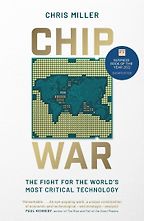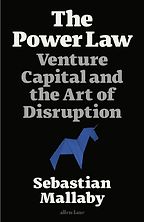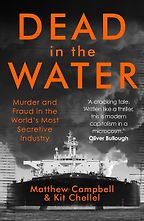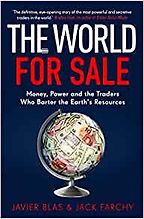Business Books About Industries
Last updated: February 17, 2023
Chip War: The Fight for the World’s Most Critical Technology
by Chris Miller
***Winner of the 2022 Financial Times Business Book of the Year Award***
***🏆 A Five Books Book of the Year ***
“Chris Miller tells us the history of how microchips were developed, emphasizing the critical role of the government, and especially defense procurement. He gives us a description of how microchips became the single most complex global good, with different pieces and aspects of the technology located in the Netherlands, the United States, Japan, Korea, and especially and most importantly, Taiwan. And he gives us a discussion of the risks that a literal war in Taiwan or an economic war of the type that we are seeing the beginning of could pose for this incredibly important complex and globalized technology.” Read more...
The Best Economics Books of 2022
Jason Furman, Economist
“Mallaby favors the idea that venture capital has been a force for good. Ordinary finance was backing the probability of beating the market by a point or two. Venture capital, right from the beginning, was about backing 10 horses, nine of whom you know are going to fall before the final hurdle, but one is going to strike enormously rich. It was originally called ‘adventure’ capital. It’s about taking these huge risks, in the hope that at least one of them will do exceptionally well. So it requires, as he makes clear, a particular type of person, with a particular mindset, in order to make this happen. It’s a pro-venture capital book. The subtitle is ‘the art of disruption’ and there has been a lot of criticism about whether disruption is really what we want. But in the case of some of the companies backed by the venture capitalists, he’s saying it was the necessary spark for wider capitalism. It’s a very nicely told story, I think.” Read more...
The Best Business Books of 2022: the Financial Times Business Book of the Year Award
Andrew Hill, Journalist
“I’m not really supposed to pick favorites but as I don’t have any say in the shortlist choice or the winner, I can say that this book is one of my favorites. It’s a thriller, starting from what sounds like an unpromising premise, of an oil tanker hijacked off the coast of Yemen. David Mockett is a marine surveyor who is called in when the boat is set on fire and the crew escape. He is called in on behalf of insurers to find out what’s gone on. I won’t give away the plot, but it’s a murky tale which ultimately turns out to be fraud.” Read more...
The Best Business Books of 2022: the Financial Times Business Book of the Year Award
Andrew Hill, Journalist
“It’s not only a very useful history of what has happened in commodities markets since World War II, but it also unearths some of the extraordinary stories and figures that worked at or led some of these big commodity trading houses. Their underlying point is that there’s a reason why these big commodities houses have minted so many billionaires and multimillionaires. It’s not only that commodities were in an extraordinary boom at a critical point after the 1970s into the early 2000s, but also that these figures were extraordinary. They were massive risk-takers, amoral people prepared to do deals with baddies to turn a commodity—be it oil, gas, coal or precious metals—into cash, and adopting the most extraordinary strategies to do so.” Read more...
The Best Business Books: the 2021 FT & McKinsey Book Award
Andrew Hill, Journalist
“What I really like about the Wiener book is that she uses her life story and the various situations that she finds herself in as a way of trying to describe this world that is emerging, but not necessarily to try and pin it down with a simple argument saying ‘this is this’ or ‘this is that.’ She starts as an underpaid publishing person in one of those miserable jobs that we all know about. Then she goes to a minor startup, and moves on through another startup, through to working for a major platform, GitHub. She never names any of the companies, but it’s often quite clear who she’s talking about, and one of the fun parts of the book for people who hang on the outside of this world is figuring out who is who. Wiener uses her own personal experiences and those of people around her to capture how the logic of information and engineering, the Marc Andreessen “Why Software is Eating the World” logic actually intersects with the real world, with real people, with real lives. Also, she wants to get at the messiness of the people who are actually implementing this stuff, the complicated ways in which they try to deny to themselves that they are part of the surveillance industry and to capture the role of women.” Read more...
The Best Books on the Politics of Information
Henry Farrell, Political Scientist




